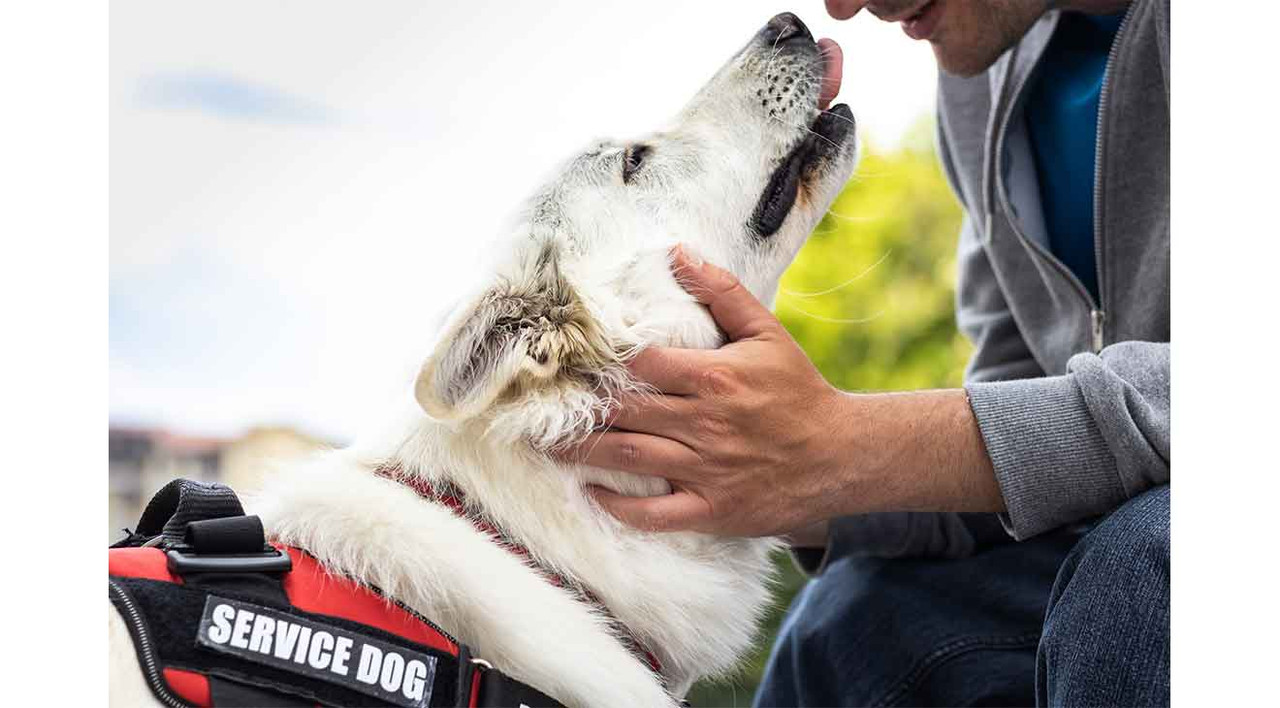Different Types of Service Dogs and Their Jobs

All dogs are good dogs, at least in our book. However, there is a group of trained professionals who do a little more good than the rest. These canines are service dogs.
For someone who is unfamiliar with the fundamentals of the working dog world, there are many different types of service dogs, each with their own specializations.
Though still working dogs, therapy dogs and emotional support animals do not fall into the category of service dogs. This distinction is made because of the training and specificity of tasks that are required of service dogs. Therapy dogs and emotional support animals do not have the same access to public facilities as service dogs, namely businesses, government buildings, restaurants, hospitals, schools, hotels, or places of employment.
Service dogs are trained to respond to the specific needs of their handlers. These needs are directly associated with a physical, sensory, psychiatric, or mental disability. The service dogs trained to assist, alert, or respond is these situations can be categorized based on the tasks needed and the dog’s specific abilities.

Autism Service Dogs
- Give cues to help their handler prioritize information. Such as a fire alarm in the midst of also processing the sound of a fan, music playing, the texture of the carpet under their feet and the feel of their clothing.
- Notify handler of repetitive behaviors they are exhibiting. These behaviors may be calming to the handler, so this notification is not to halt the behavior, rather to make the handler aware that it is happening.
- Apply pressure on handler’s body to help calm them.
Hearing Dogs
- Alert handler to environmental sounds. Such as sirens, a phone ringing, a doorbell, etc.
- May be used outside the home, but some handlers make a personal decision not to use their hearing dog in public.
- Are often shelter or rescue dogs given a second chance. It is not certain which genes are responsive to sound, so becoming a hearing dog may be a path for dogs to be rescued.
Mobility Dogs
- Assist handlers who are wheelchair users by picking up dropped items, opening/closing doors, turning on/off light switches, and exchanging items that may be out of their handler’s reach.
- Aid with stability and balance for handlers who are ambulatory but require assistance to maintain mobility.
- Require more extensive training, and at a later age. The dog’s growth plates must be completely closed before any training with a special mobility harness can begin in order to prevent injury the dog.
Diabetic Alert Dogs
- Alert handler to chemical changes in their blood sugar so they will inject insulin or ingest glucose to prevent a diabetic emergency.
- Notify others in the household or set off an alarm system in the case of emergency.
Allergy Detection Dogs
- Sniff out and alert handler of allergens present in an environment.
- Used primarily with children to give parents peace of mind and allow children more independence.
Seizure Alert/Response Dogs
- Alert handlers with epilepsy 10-20 minutes before a seizure. This gives the person the opportunity to move to a safer location, take medication, or call for help.
- Respond during or after a seizure to roll handler on their side to open airway, clear airway, alert or call for help, and block from hazards.
- The ability to alert a person of an oncoming seizure is present naturally in some dogs cannot be trained.
While many of these types of service dogs can be sorted by the trained skills of the dog and the disability of their handler, each situation is different. Service dogs’ abilities are trained based on the individual needs of their handler. The disabilities and specific needs of the person determine what abilities their service dog must have and what tasks the dog is required to perform.
dogIDs offers tags specifically for therapy dogs, emotional support animals and service dogs. We also have service dog supplies for all types of working dogs, including dog collars, leashes and harnesses with personalized inscriptions on them to let the world know what their job is.
Explore Popular Articles
-
How to Pick the Best Dog Collars for Large Dogs?
Mar 12, 2025Large dogs bring a special kind of joy to any household. Whether it’s the calm, noble presence
-
What Is a Traffic Leash for Dogs?
Feb 21, 2025Picture this: you’re walking your lovable Labrador, Sammy, through a bustling city side
-
What Dog Collars Are Recommended for Saint Bernards? A Comprehensive Guide
Feb 12, 2025Saint Bernards holds a special place in the hearts of dog lovers worldwide. With their iconic




